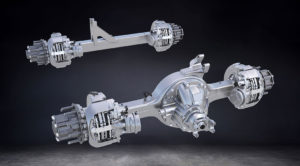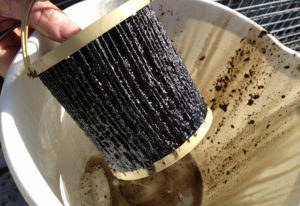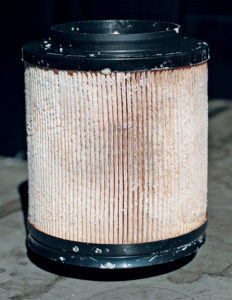If you’re looking for new ways to increase efficiency, one thing to keep in mind is the overall weight of the tractor. “Lightweighting” is a popular new trend fleets are using to increase fuel economy, but you can take advantage of lightweighting, as well. Efficiency gained can be up to 0.5% to 0.6% for every 1,000 lbs. of weight reduction. If you manage to lose 4,000 pounds of weight, that’s a 2% MPG gain, which is significant. Think of all the benefits of a lighter vehicle – less energy is needed to accelerate, brake, and change direction. In addition to using less fuel, there will also be less wear and tear on the engine, brakes, tires, and driveline. It also allows you to take heavier loads when you need or want to, which will make you more money.
OEMs are looking into offering aluminum frames, carbon fiber cabs, and even a lightweight film instead of paint. But until all those options become available, you can still spec a new truck to be lighter weight. A big sleeper cab might be comfortable and look cool, but they can add a significant amount of weight. Consider a shortened wheelbase, too. You can save 5 pounds per inch on a shorter frame. Consider a 6×2 axle configuration to save 400 lbs. This will also reduce mechanical inefficiency and increase mileage even more.
If you’re looking to lighten up an old truck, air suspension will save you 275 pounds, aluminum wheels could be up to 500 pounds total (in comparison to steel wheels), and composite brake drums can save you 50 pounds per wheel. Stationary 5th wheels are the lightest type of 5th wheel. It may seem obvious, but the first place to start is to get rid of any junk you’ve been hauling around in your truck you don’t need. We do recommend having some basic tools with you but refrain from bringing the entire tool chest if you can. The best part about this type of “lightweighting” is it’s free! Overall, lightweighting might not completely transform your truck, but every little bit helps when chasing more MPG and extending the life of your engine.
We’ve had quite a few reports of bad diesel fuel recently. Quite often people are experiencing a rough running engine and don’t think to check the fuel first. It’s one of the most common causes of a rough, sputtering, or weak running engine. Good diesel fuel should be clear and slightly yellow in color. If it’s opaque, like lemonade, you probably have water in the fuel. If it’s a dark amber color, that usually means asphaltenes, which is a black tar-like substance caused from age, pressure, and heat. An amber color can also indicate microbes, which is a result of water in the tank. Both asphaltenes and microbes will result in a black oily looking filter. If your filter has a white or cream color substance stuck on it, that’s an indication of DEF in the fuel.
There are several ways to find out what sort of condition your fuel is in. The easiest is to inspect your fuel filter while replacing it or ask your mechanic to check it out for you. You can also sample the tank to look at the fuel firsthand. If you want to be extra thorough, you can send a fuel sample to a lab to be tested. Diagnosing bad fuel is something almost anyone can do, as it’s usually pretty obvious just by looking at it to see if there is an issue or not. Don’t spend money replacing random parts until you find the root cause, which can often be as simple as bad fuel.
If you have an older truck, you may want to consider running our Max Mileage product for the injector cleaning properties. Some diesel fuels are sold with detergents, but many aren’t. This means your injectors are prone to buildup, which changes the spray pattern, and will negatively affect performance and fuel mileage. Here is one such case where Max Mileage solved a pesky injector problem. The following was sent to us by Wendy Wolfe.
“We started using Max Mileage over a year ago in our 1999 KW W900L with an N14 Celect Plus engine. We’ve gained .5 mpg but even more important is the performance. Anyone with an N14 knows about injector issues. We used to replace one every month or two. We put in six reman injectors when the engine was overhauled in December 2019. We replaced three of them before July. We haven’t had a problem since we started using this product in July 2020. Our truck will never get a fill-up without Max Mileage again!”
And there you have it, folks – the proof is in the pudding! I know I talk a lot about it, but let me tell you, this stuff really works! Thanks to Andrew Wilson and Leroy Pershing for helping me put this article together. If you have performance issues or questions, or possible problems with your fuel system, call (724) 360-4080, stop by our shop in Saxonburg, PA or visit www.pittsburghpower.com today.



